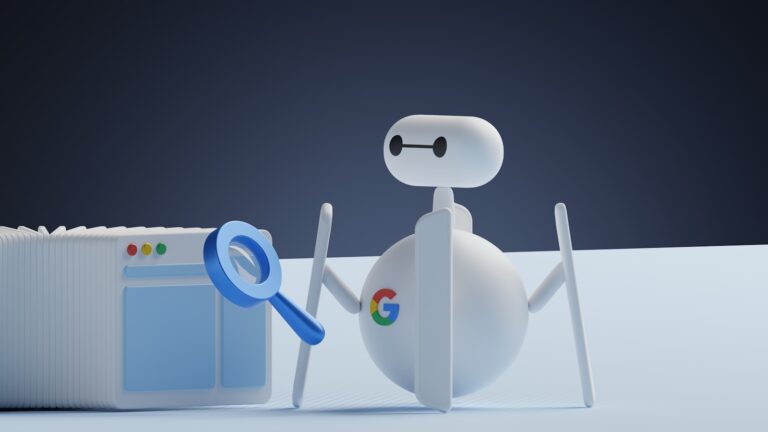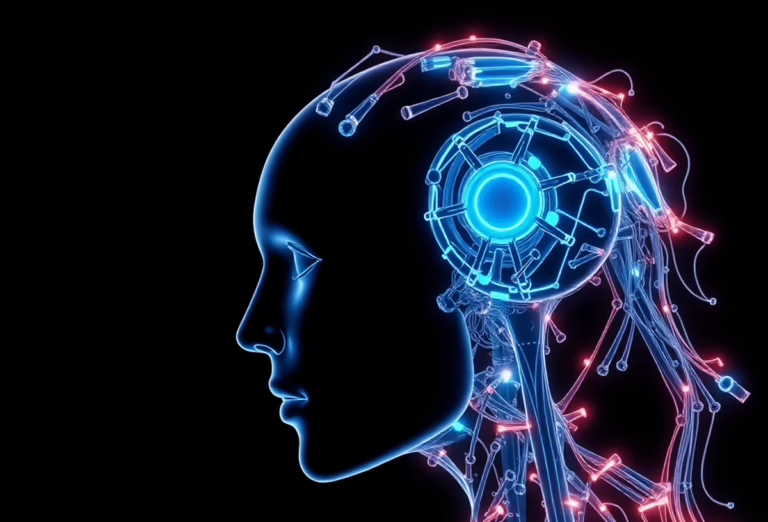Will AI Replace Digital Marketing? Exploring the Future of Marketing in a Tech-Driven World
As we stand on the brink of a technological revolution, the question on everyone’s mind is: will AI replace digital marketing? The rapid evolution of artificial intelligence has transformed traditional marketing strategies, introducing innovative tools that optimize campaigns and enhance customer engagement. Yet, this raises a crucial debate—can machines truly replicate the creativity and intuition of human marketers? In this article, we’ll explore how AI is shaping the future of marketing in a tech-driven world, examining its potential to streamline operations, provide data-driven insights, and personalize customer interactions. While the landscape is changing, the human touch remains invaluable, as it brings empathy and understanding to the complex world of consumer behavior. Join us as we delve into the dynamic interplay between AI and digital marketing, uncovering what the future holds for professionals in this exciting, ever-evolving field.
Current Trends: How AI is Transforming Digital Marketing
Artificial Intelligence has become a transformative force in digital marketing, revolutionizing the way businesses approach their campaigns. Among the most notable trends is the utilization of AI-powered chatbots, which have significantly improved customer service. These chatbots provide instant responses to customer inquiries, ensuring a seamless experience that fosters engagement and satisfaction. Beyond customer service, AI is enhancing content creation, enabling marketers to generate personalized content tailored to individual preferences and behaviors.
Predictive analytics is another area where AI is making a substantial impact. By analyzing vast amounts of data, AI algorithms can forecast future market trends and consumer behaviors, allowing marketers to make informed decisions. This capability not only improves the efficiency of marketing strategies but also maximizes their effectiveness. Moreover, AI-driven tools are streamlining the process of ad targeting, ensuring that advertisements reach the most relevant audiences. Consequently, businesses can achieve higher conversion rates and reduce wasted ad spend.
Social media platforms have also embraced AI to enhance their functionalities. From sentiment analysis to automated content scheduling, AI tools are empowering marketers to manage their social media presence more effectively. By understanding user sentiments, businesses can tailor their social media strategies to resonate with their audience, fostering stronger connections and brand loyalty. As AI continues to evolve, its integration into digital marketing is expected to deepen, driving further innovation and efficiency in the field.
Benefits of AI in Marketing Strategies
The integration of AI into marketing strategies brings a multitude of benefits, fundamentally changing the landscape of digital marketing. One of the most significant advantages is the ability to provide personalized experiences at scale. AI technologies analyze consumer data to understand individual preferences, enabling businesses to deliver tailored content, recommendations, and advertisements. This personalization fosters a deeper connection with consumers, enhancing engagement and driving conversions.
Efficiency is another key benefit of AI in marketing strategies. AI-powered tools automate repetitive tasks such as data analysis, content creation, and customer segmentation. This automation not only reduces the workload for marketing teams but also ensures accuracy and consistency in executing campaigns. As a result, marketers can focus on more strategic activities, such as creative planning and innovation, while AI handles the operational aspects.
Furthermore, AI enhances decision-making through advanced analytics and insights. By processing vast amounts of data, AI algorithms uncover patterns and trends that may go unnoticed by human analysts. These insights enable marketers to make informed decisions about campaign strategies, budget allocation, and targeting approaches. Additionally, AI-driven predictive analytics allow businesses to anticipate market changes and consumer behaviors, ensuring they stay ahead of the competition.
Common Misconceptions about AI and Marketing
Despite the numerous benefits AI offers to digital marketing, several misconceptions persist. One common false belief is that AI will completely replace human marketers. While AI can automate many tasks, it lacks the creativity, intuition, and emotional intelligence that human marketers bring to the table. AI serves as a powerful tool to augment human capabilities, not replace them entirely.
Another misconception is that AI is infallible and can solve all marketing challenges. In reality, AI systems are only as good as the data they are trained on. Poor-quality or biased data can lead to inaccurate predictions and ineffective strategies. Therefore, human oversight is crucial to ensure that AI algorithms are functioning correctly and producing reliable results.
Some believe that implementing AI in marketing is prohibitively expensive and complex. While there are costs associated with adopting AI technologies, the long-term benefits often outweigh the initial investment. Moreover, advancements in AI have made these tools more accessible and user-friendly, allowing businesses of all sizes to leverage their capabilities. Proper training and onboarding can help marketing teams integrate AI seamlessly into their operations.
The Role of Human Creativity in an AI-Driven World
In an AI-driven world, human creativity remains an indispensable asset in digital marketing. AI can process data and automate tasks, but it cannot replicate the nuanced understanding and emotional intelligence that humans possess. Creative thinking is essential for developing compelling campaigns that resonate with audiences on a personal level. Human marketers bring originality and innovation to the table, crafting narratives that captivate and inspire.
Storytelling is a prime example of where human creativity excels. While AI can generate content based on data, it lacks the ability to weave emotion and context into a narrative. Human marketers understand the cultural and social factors that influence consumer behavior, enabling them to create stories that connect with audiences. This emotional connection is vital for building brand loyalty and fostering long-term relationships with customers.
Collaboration between AI and human creativity can yield powerful results. AI can provide insights and streamline processes, freeing up time for marketers to focus on creative aspects. For instance, AI can identify trending topics and consumer preferences, allowing marketers to tailor their content accordingly. By combining AI’s analytical prowess with human creativity, businesses can develop innovative and effective marketing strategies that stand out in a crowded marketplace.
Case Studies: Successful Integration of AI in Marketing Campaigns
Numerous case studies highlight the successful integration of AI in marketing campaigns, showcasing its transformative impact. One notable example is Coca-Cola’s use of AI to enhance its advertising strategies. By employing AI-driven predictive analytics, Coca-Cola was able to identify consumer preferences and trends, tailoring its advertisements to resonate with different audience segments. This approach led to increased engagement and higher conversion rates.
Netflix is another business that has leveraged AI to revolutionize its marketing efforts. The streaming giant uses AI algorithms to analyze viewer data and recommend personalized content. This level of personalization has significantly improved user satisfaction and retention rates. Additionally, Netflix’s AI-driven marketing campaigns target specific user segments with tailored messages, enhancing the effectiveness of their promotional efforts.
Sephora, the beauty retailer, has successfully integrated AI into its customer service and marketing strategies. Sephora’s AI-powered chatbot, Sephora Virtual Artist, provides personalized beauty advice and product recommendations based on user preferences. This innovative approach has enhanced customer engagement and satisfaction, driving sales and fostering brand loyalty. By embracing AI technologies, Sephora has set a new standard for personalized customer experiences in the retail industry.
Future Predictions: AI’s Impact on Marketing Jobs
The rise of AI in digital marketing is set to have profound implications for marketing jobs. While some fear that AI will lead to significant job losses, the reality is more nuanced. AI will undoubtedly automate certain tasks, reducing the need for manual labor in areas such as data analysis and customer segmentation. However, this automation will also create new opportunities for marketers to focus on more strategic and creative aspects of their work.
One potential impact of AI is the shift in skill requirements for marketing professionals. As AI takes over routine tasks, marketers will need to develop skills in areas such as creative thinking, strategic planning, and data interpretation. The ability to work alongside AI and leverage its capabilities will become increasingly important. Marketers who can adapt to this new landscape and acquire the necessary skills will thrive in the AI-enhanced marketing world.
Furthermore, AI is likely to create new roles within the marketing industry. Positions such as AI specialists, data analysts, and AI-driven content creators will become more prevalent. These roles will focus on developing and managing AI technologies, ensuring they are effectively integrated into marketing strategies. As businesses continue to embrace AI, the demand for professionals with expertise in AI and marketing will grow, leading to new career opportunities.
Ethical Considerations in AI Marketing
The integration of AI into marketing strategies raises important ethical considerations that businesses must address. One major concern is the potential for bias in AI algorithms. AI systems are trained on data, and if this data is biased, the resulting algorithms can perpetuate and amplify these biases. This can lead to discriminatory practices in targeting and personalization, harming certain consumer groups.
Privacy is another critical issue in AI marketing. AI technologies often rely on vast amounts of consumer data to function effectively. Businesses must ensure that they handle this data responsibly, protecting consumer privacy and complying with regulations such as GDPR. Transparent data practices and informed consent are essential to maintaining consumer trust and avoiding ethical pitfalls.
Moreover, the use of AI in marketing must consider the impact on consumer autonomy. AI-driven personalization can sometimes lead to manipulative practices, where consumers are influenced to make decisions that may not be in their best interest. Businesses must strike a balance between personalization and respect for consumer autonomy, ensuring that their marketing practices are ethical and transparent.
Preparing for an AI-Enhanced Marketing Landscape
As AI continues to shape the future of digital marketing, businesses must prepare for an AI-enhanced landscape. This preparation involves several key steps, starting with education and training. Marketing teams need to understand the capabilities and limitations of AI technologies, gaining the skills required to leverage them effectively. Continuous learning and development will be crucial in adapting to the evolving AI-driven marketing environment.
Investing in AI tools and technologies is another essential step. Businesses must evaluate their current marketing processes and identify areas where AI can add value. Implementing AI-powered solutions such as predictive analytics, chatbots, and personalized content platforms can enhance efficiency and effectiveness. A strategic approach to AI adoption will ensure that businesses maximize the benefits of these technologies.
Collaboration between humans and AI is vital for success. Marketing teams should foster a culture of collaboration, where human creativity and AI capabilities are integrated seamlessly. This involves developing workflows that leverage AI for data-driven insights while allowing human marketers to focus on the creative and strategic aspects. By embracing this collaborative approach, businesses can harness the full potential of AI in their marketing strategies.
Conclusion: Embracing Change in Digital Marketing
The future of digital marketing is undoubtedly intertwined with the advancements in artificial intelligence. While AI offers numerous benefits, including efficiency, personalization, and data-driven insights, the human touch remains irreplaceable. Human creativity, intuition, and emotional intelligence are essential for developing compelling campaigns that resonate with audiences. The successful integration of AI in marketing involves a collaborative approach, where AI augments human capabilities rather than replacing them.
As businesses navigate this AI-enhanced landscape, they must address ethical considerations, ensuring that their practices are responsible and transparent. The preparation for an AI-driven future involves education, investment in technologies, and fostering collaboration between humans and AI. By embracing these changes, businesses can stay ahead of the curve and leverage AI to drive innovation and success in their marketing strategies.
In conclusion, while AI is transforming digital marketing, it is not a replacement for human marketers. Instead, it is a powerful tool that enhances their capabilities, enabling them to deliver personalized and effective campaigns. The dynamic interplay between AI and human creativity will shape the future of marketing, offering exciting opportunities for professionals in this ever-evolving field.
To know more on “will AI replace Digital Marketing”, consider reading the following; Will AI Replace Marketing Jobs? or Will AI Replace Digital Marketing? Understanding the Future of Creativity and Automation



